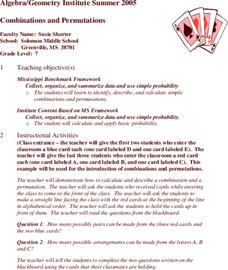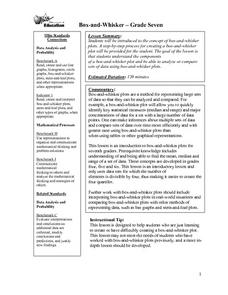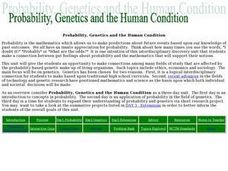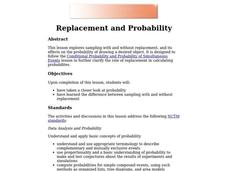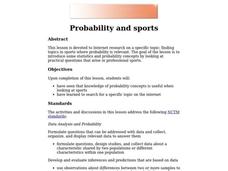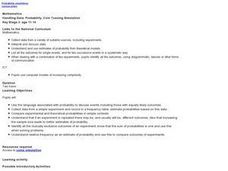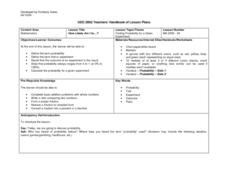Curated OER
Paper Parachutes
Students participate in a simulation of a parachute-jump competition by making paper parachutes and then dropping them towards a target on the floor. They measure the distance from the point where the paper parachute lands compared to...
Curated OER
Probability Two Events
Students investigating the concept of probability practice the concept using a variety of different example problems. The instructional activity is delivered in a question and answer format. The frequency of answers is recorded in a data...
Curated OER
Probability Of One Event
Learners investigate the concept of probability. They use example problems in order to measure the likelihood of various outcomes. The lesson includes dialogue to be used by the teacher during direct instruction. They also use class...
Curated OER
Box And Whiskers
Learners investigate the concept of using box and whisker plots. They demonstrate how to use them to compute median, mode, and range. Students compare and contrast the complete and systematic processes use to solve problems. This is done...
Curated OER
Probability
Fifth graders study probability of events. They predict outcomes, and participate in hands-on experiments to find the probability of specified events. Afterward, 5th graders write probability of events in fractions and decimals.
Curated OER
Probability
Fifth graders participate in a lesson that is concerned with the mastery of math concepts related to probability. They play a math game that is an adaptation from Rock, Paper, and Scissors.
Curated OER
Combinations and Permutations
Fifth graders investigate the concepts of combinations and permutations using probability. They practice calculations using probability to measure the outcomes. Students demonstrate how to organize and categorize the data.
Curated OER
Chance (Probability) Operations in Dance Composition -
Eighth graders investigate modern-dance choreographer Merce Cunningham's historically significant contribution to dance-making history. Specifically, 8th graders explore and practice Merce Cunningham's choreographic use of chance...
Curated OER
Box-and-Whisker
Seventh graders are introduced to the concept of box-and-whisker plots. A step-by-step process for creating a box-and-whisker plot is provided. The goal of the lesson is that students study the components of a box-and-whisker plot and be...
Curated OER
Probably or Probably Not?
Students utilize the interactive spinner and write down the probability of each color in reduced fraction form in the "Experimental Results" column, labeling each color and its corresponding probability in the same order as in the...
Curated OER
Probability Polly
Young scholars evaluate if an event is certain, probable, or impossible. They design and create a spinner to be used in a game which demonstrates the possible outcome of an event.
Curated OER
Probability, Genetics and the Human Condition
Students explore the concept of probability as it relates us to be able to make predictions about future events based upon our knowledge of past outcomes. They have an innate appreciation for probability. Students make a connection...
Curated OER
Fair Games
Students participate in several chance activities and examine a few games for fairness. They become game designers who are asked to design a fair game for a toy company. Students must describe the rules for play and examine...
Curated OER
Math in Society
Twelfth graders determine probabilities of real-life events such as life expectancies, winning a lottery ticket and the break-even premium. They apply how life-expectation tables are used to estimate the probability that an individual...
Curated OER
Location, Location, Location!
Students determine the probability of drawing coins from each of the three United States Mints. They measure the distance between the Mints and determine which is closest to them. They convert fractions to percentages.
Curated OER
From Probability to Combinatorics and Number Theory
Students see how division is used to help solve probability problems. They use tables as data structures where they are used to count outcomes and to compute probabilities. Students use games to help solve probability problems.
Curated OER
Replacement and Probability
Students explore sampling with and without replacement. They explore the effects on the probability of drawing a desired object. Students examine probability and the difference between sampling with and without replacement.
Curated OER
Expected Value
High schoolers discuss what expected value is, they are introduced to the concept of varyting payoffs. Students use a computer simulation of a "real world" example where expected value is used.
Curated OER
Probability and Sports
Students research topics on the internet where probability is relevant. Students study statistics and probability concepts by looking at practical questions that arise in professional sports.
Curated OER
Handling Data: Coin Tossing Simulation
Students collect experimental data and record it on a frequency table. After accessing an Internet coin toss simulation site they discover that repetition of an experiment may result in different outcomes. They identify the mutually...
Curated OER
Handling Data: Probability, Chase Me game
Young scholars participate in a simulation in which the aim is for the tortoise to catch up with the hare or vice versa. Moves are decided by throwing two dice. Adding together the numbers on the two dice tells you which animal moves...
Curated OER
Investigating the Probability
Students investigate probability using coins and dice. They collect data, graph, organize and interpret data. They predict, describe, compare, compute and draw conclusions based on what they observe and record.
Curated OER
What's the Chance?
Students conduct probability experiments with dice and coins. They watch a video for a variety of situations where calculating the probability is complicated by total number of possibilities. They solve problems presented in the video.
Curated OER
Probability: How Likely Am I to...?
Twelfth graders examine various ways probability is applied to daily situations. They use marbles and blocks to calculate the probabilities of picking certain colors. They also calculate the odds of picking a winning raffle ticket.








